Located in the quiet, slow-living Minsheng Community (民生社區), near the tree-lined Fujin Street (富錦街), Monsieur L Restaurant has the look of a nice, quaint neighborhood eatery and the substance of a multicourse feast. Though the food on offer is hit-and-miss, the restaurant is a pleasant spot to take in the unhurried ambiance of the charming neighborhood, while enjoying an elaborate meal and professional service usually found at a much fancier establishment.
Painted terracotta red and furnished with a wooden front deck, the Monsieur L’s exteriors blends in nicely with the lush, shady sidewalk where it is located, giving off a hint of rustic charm. But once inside, diners will find a team of uniformed wait staff and a kitchen crew under the management of head chef Cage Ou (歐俊辰). According to the restaurant’s Web site, Ou spent time working at the Marco Polo Italian restaurant of Shangri-La’s Far Eastern Plaza Hotel in Taipei as well as other hotels, which probably explains the more formal vibe and cuisine.
My dining companion and I visited on a recent Sunday afternoon to try out its four-course lunch sets, available on weekends. Business was brisk as nearly every table was taken at the spacious restaurant. While busy, our waitress managed to remain efficient, come to fill up our water glasses frequently and ask how our food was in a manner that suggested she actually cared.
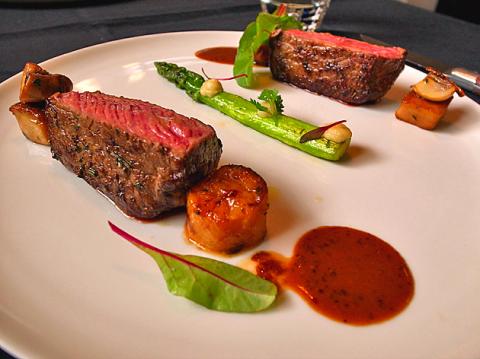
Photo: Ho Yi, Taipei Times
We ordered two set meals priced NT$1,080 and NT$1,280. The basket of warm bread served with balsamic vinegar and fragrant olive oil is worth a special mention. Among the appetizers and soup that followed, the baby squid with salami and anchovy chick pea puree was a palate-titillating treat. Finely seared, the squid tentacles offered a subtle contrast to the tenderly cooked body, whose fresh, light taste struck a nice balance with the savory salami. Though it sounded interesting, the duck consomme with shiitake mushroom and fireweed, however, tasted rather bland.
I didn’t realize the true meaning of its epithet until the tomahawk pork chop with grilled French green beans with apple butter sauce arrived at our table. To my surprise, the gigantic portion of my main course was enough to feed a hungry hunter. After the initial shock, I quickly came to admire that, despite its massiveness, the meat was able to retain its tender texture from the first to last bite.
Setting his expectations high, my dining partner was sadly disappointed with the grilled US prime strip loin steak with fondant potato and Pommery mustard seed sauce. Cooked medium, the steak was more on the tough and chewy side than on the soft and melt-in-your-mouth end.
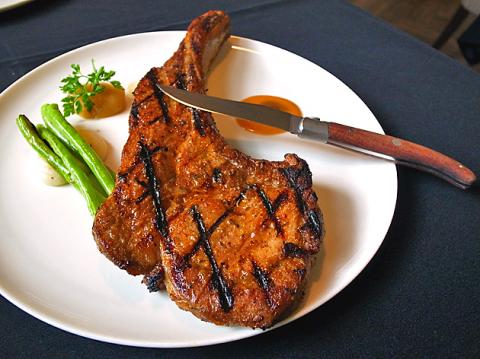
Photo: Ho Yi, Taipei Times
Our disillusion over the steak was dispersed when the desserts were served. While the sweet course is often undistinguished in the city’s many similar establishments, Monsieur L takes its sweets seriously, preparing them in a separate kitchen manned by a pastry chef trained in New York City. The rum sabayon with peanut butter cookie and milk ice cream that my dining partner had was a finely crafted treat for adults, combining, as it did, the delicious scent of rum with the milky and peanut buttery flavors. I was equally impressed by my caramel apple tart with mille-feuille and calvados ice cream, highlighted by the aroma of apple brandy and cinnamon.
In addition to the reasonably priced set meals, Monsieur L offers an a la carte menu for lunch and dinner. The restaurant also changes its menu every two to three months to keep it fresh and attractive.
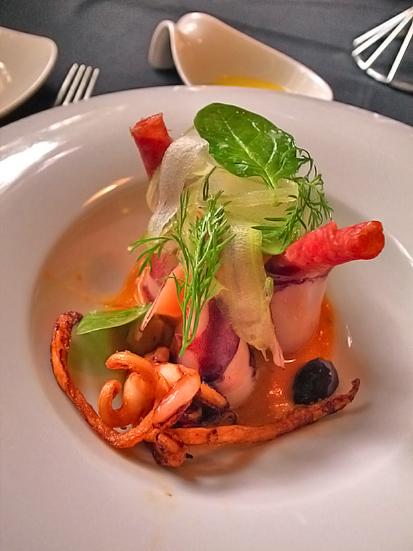
Photo: Ho Yi, Taipei Times
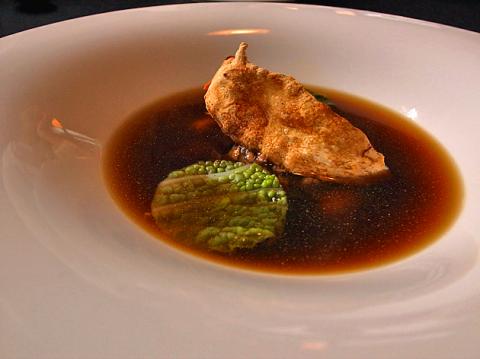
Photo: Ho Yi, Taipei Times
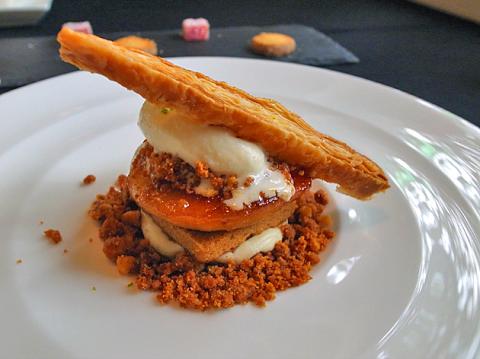
Photo: Ho Yi, Taipei Times

That US assistance was a model for Taiwan’s spectacular development success was early recognized by policymakers and analysts. In a report to the US Congress for the fiscal year 1962, former President John F. Kennedy noted Taiwan’s “rapid economic growth,” was “producing a substantial net gain in living.” Kennedy had a stake in Taiwan’s achievements and the US’ official development assistance (ODA) in general: In September 1961, his entreaty to make the 1960s a “decade of development,” and an accompanying proposal for dedicated legislation to this end, had been formalized by congressional passage of the Foreign Assistance Act. Two

Despite the intense sunshine, we were hardly breaking a sweat as we cruised along the flat, dedicated bike lane, well protected from the heat by a canopy of trees. The electric assist on the bikes likely made a difference, too. Far removed from the bustle and noise of the Taichung traffic, we admired the serene rural scenery, making our way over rivers, alongside rice paddies and through pear orchards. Our route for the day covered two bike paths that connect in Fengyuan District (豐原) and are best done together. The Hou-Feng Bike Path (后豐鐵馬道) runs southward from Houli District (后里) while the

On March 13 President William Lai (賴清德) gave a national security speech noting the 20th year since the passing of China’s Anti-Secession Law (反分裂國家法) in March 2005 that laid the legal groundwork for an invasion of Taiwan. That law, and other subsequent ones, are merely political theater created by the Chinese Communist Party (CCP) to have something to point to so they can claim “we have to do it, it is the law.” The president’s speech was somber and said: “By its actions, China already satisfies the definition of a ‘foreign hostile force’ as provided in the Anti-Infiltration Act, which unlike

Mirror mirror on the wall, what’s the fairest Disney live-action remake of them all? Wait, mirror. Hold on a second. Maybe choosing from the likes of Alice in Wonderland (2010), Mulan (2020) and The Lion King (2019) isn’t such a good idea. Mirror, on second thought, what’s on Netflix? Even the most devoted fans would have to acknowledge that these have not been the most illustrious illustrations of Disney magic. At their best (Pete’s Dragon? Cinderella?) they breathe life into old classics that could use a little updating. At their worst, well, blue Will Smith. Given the rapacious rate of remakes in modern